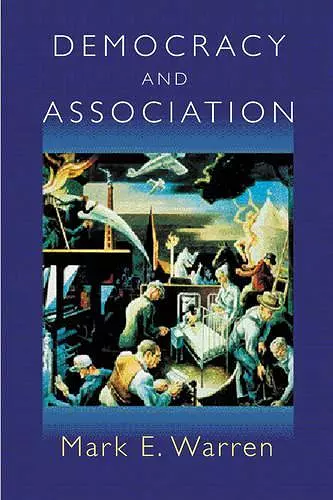Democracy and Association
Format:Paperback
Publisher:Princeton University Press
Currently unavailable, and unfortunately no date known when it will be back

The first political theorist to attempt this sort of comprehensive analysis, Mark Warren takes a welcome, generous view of the democratic consequences of associational life. He defines his purposes carefully and fulfills them admirably. His critical moves are sharp and almost always dead on, and his excellent use of social theory is surprisingly rare among political theorists. -- Nancy Rosenblum, Brown University, author of "Membership and Morals: The Personal Uses of Pluralism in America" This is a well-organized and executed discussion of a neglected aspect of an important topic. Contemporary political theory is replete with claims about the democratic effects of associational life, but this book is the first attempt to distinguish analytically the various possible democratic effects of associational life and, in particular, to hypothesize how each effect is related to specific forms and instances of associational life. As such, it is an original and genuine contribution to our developing understanding of the associational bases of democratic politics. -- Stuart White, Jesus College, Oxford University
Assesses what associations do and don't do for democracy. This book explains how and when associational life expands the domain, inclusiveness, and authenticity of democracy. It looks at which associations are most likely to foster individuals' capacities for democratic citizenship.Tocqueville's view that a virtuous and viable democracy depends on robust associational life has become a cornerstone of contemporary democratic theory. Democratic theorists generally agree that issue networks, recreational associations, support circles, religious groups, unions, advocacy groups, and myriad other kinds of associations enhance democracy by cultivating citizenship, promoting public deliberation, providing voice and representation, and enabling varied forms of governance. Yet there has been little work to show how and why different kinds of association have different effects on democracy--many supportive but others minimal or even destructive. This book offers the first systematic assessment of what associations do and don't do for democracy. Mark Warren explains how and when associational life expands the domain, inclusiveness, and authenticity of democracy. He looks at which associations are most likely to foster individuals' capacities for democratic citizenship, provoke political debate, open existing institutions, guide market activities, or bring democratic decision-making to new venues. Throughout, Warren also considers the trade-offs involved, noting, for example, that organizational solidarity can dampen internal dissent and deliberation even as it enhances public deliberation. Blending political and social theory with an eye to social science, Democracy and Association will draw social scientists with interests in democracy, political philosophers, students of public policy, as well as the many activists who fortify the varied landscape we call civil society. As an original analysis of which associational soils yield vigorous democracies, the book will have a major impact on democratic theory and empirical research.
Winner of the David and Elaine Spitz Prize Winner of the Outstanding Book Award, Association for Research on Nonprofit Organizations and Voluntary Action "Democracy and Association is an important contribution not only to the field of political theory but also to empirical political science. Warren's multifaceted typologies are a major advance."--Margaret Kohn, Political Theory
- Winner of International Conference for the Study of Political Thought David and Elaine Spitz Prize 2003
ISBN: 9780691050775
Dimensions: unknown
Weight: 369g
280 pages